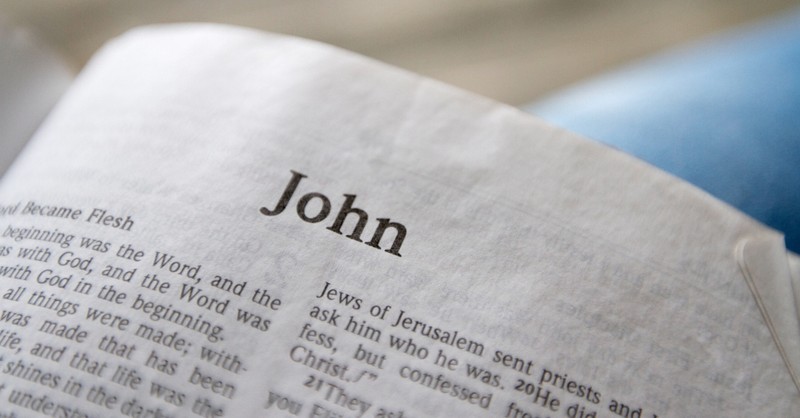
“I hate my life!”
Those words create immediate alarm. When I have a student (or adult) say something similar, I’m always probing for more information. I need to make sure that self-harm isn’t in the picture.
Yet in John 12:25 we read these words:
“Whoever loves his life loses it, and whoever hates his life in this world will keep it for eternal life.”
Is Jesus telling us to hate our life? How could this possibly be the path to eternal life? What does Jesus mean in John 12:25?
Photo credit: ©Getty Images/eyetoeyePIX

What Is the Context of John 12?
At the end of John 11, the religious leaders are determined to kill Jesus. Caiaphas, the high priest, has concluded that Jesus must die in order to save the entire nation from Rome. If Jesus continues stirring people up, then it is assumed that Rome will try to squelch the movement and the entire nation could be lost. (Which ironically did happen from 66-70AD).
The events of John 12 ratchet up the impending death of Jesus. But this little section in John 12 seems a bit odd. A group of Greeks come to Philip and Andrew wanting to see Jesus. When they tell Jesus this news He says, “The hour has come.” There is something about this request that signals to Jesus that the time for his death, burial, and resurrection is now upon Him.
In verse 24 Jesus uses an illustration with which those in an agrarian society would have been familiar. When you plant a seed it “dies” but that death produces much fruit. If a seed stays in your hand it will remain nothing more than a single seed. But that seed planted into the ground will germinate and produce new life.
Jesus is that seed. His death will produce fruit. Perhaps, the Greeks (non-Jews) coming with a request to see Him, caused him to think of the worldwide harvest which would take place upon His death and resurrection. But Jesus also connects his own death with the call of discipleship that is placed upon the lives of his disciples.
Verse 25 is a restatement of the illustration of verse 24, but it is also an invitation to disciples to follow Jesus in fruit-producing death.
Photo credit: ©Sparrowstock

What Does This Verse Mean?
What “hates his life” means is defined by the context. It’s similar to what Jesus said in Luke 14:26 in reference to “hating” your family. It’s comparative language. It means to value life less than you value your allegiance to Jesus.
If we use our imagination and give the ability of speech and thought to our proverbial seed, we can understand Jesus’ meaning. If the seed loves its present form of existence, though lonely, and refuses to be buried into the ground then it’ll remain a lonely seed. Eventually that lonely seed will lose all ability to germinate. It will become a dormant seed and be swallowed up in death.
But if that seed “hates” its life and says, “I prefer to lay down this present form of existence, so that I can bear fruit” then it’ll be planted in the ground and bear much fruit. It’s not so much that the seed abhors its present existence, but in comparison to the glory of becoming a fruit tree, it’s not something worth holding onto.
Jesus’ disciples are given this same choice. Jesus paved the way and has shown them that laying down your life leads to much fruit. In the same way if his disciples cling to their life, to a worldly existence with no view to eternity, they will end up being as that seed. Some day they will grow old and die. And all the potential for bearing fruit and leaving any kind of God-honoring legacy will die with them. But if they refuse to cling to this life, and instead cling to a life of obedience to the will of the Father, they will bear much fruit.
Photo credit: ©Getty Images/jchizhe

What Does It Mean to Love and Hate Your Life?
When we come to answer questions like this, it is important to consider the whole counsel of God and each verse within its own context. Let’s pretend for a moment that we made “you should hate your own life” as the governing verse for all of Scripture. And when we say “hate” we mean things like loath, detest, abhor, abominate, despise, etc. To hate your life would be to treat it with contempt. To not hold any value or esteem of your life. To hate your very existence.
Stick with me, here.
Now what do you do with Jesus’ command in Mark 12:31? Love your neighbor as yourself. If you loathe yourself and you’re supposed to love your neighbor in the same way, then does that mean we follow Jesus by hating our neighbor? Of course not, that would be nonsensical. And if your neighbor blows leaves in your yard all the time, it’d hardly take a work of the Spirit to obey this verse that way.
Or what would we do with Ephesians 5:29 when Paul says, “For no one hates his own flesh but rather nourishes and cherishes it, even as Christ does the church”? Does Paul contradict what Jesus is saying? He seems to be taking this notion of “self-care” as a good thing, a thing which can illustrate the love of Christ for His body, the church. How do we make sense of Ephesians 5:29 if Jesus was also saying we should hate our own bodies, loathe our existence, abhor our life?
This helps us to see that what Jesus means by “love” and “hate” in this particular verse is something like “value” and “consider as less valuable.” Again, the usage here is similar to Luke 14:26. The Theological Dictionary of the New Testament has a helpful word from Luke 14:26 for the meaning of hate:
“The reference is not to hate in the psychological sense, but to disowning, renunciation, rejection, as in the Wisdom literature of the OT. Those who become disciples of Jesus must be committed exclusively to Him; they cannot be bound to anyone or anything else. The term ‘hate’ demands the separation of the disciple, and the warning not to love anyone or anything more is the test.”
Photo credit: Unsplash

Why Will Those Who Hate Their Life Have Eternal Life?
I watched a video a few years ago which perfectly illustrates this principle. There was a dog, one of those lovably dumb dogs, with a giant stick in his mouth. Though probably three times bigger than the dog itself, this stick was going to be his new toy. He joyously pranced along carrying this fallen tree in his teeth but was put to a stop when he encountered the family gate. He couldn’t get through the door and keep his stick at the same time.
He kept trying. Twisting, turning, running faster, dropping the stick — going in the gate and then trying to pull the stick back through. Nothing would work. He couldn’t have his stick and the comfort of his bed at the same time. It was the stick or home, one had to go.
The same is true for followers of Jesus. If I love myself more than Jesus, I’ll never embrace Him. I’ll relate to Him as a genie, or a helping friend, or a nice chap who gives quality wisdom. But I’ll never be able to relate to Him as He truly is unless I’m willing to drop the stick.
It’s not really “hating your life” that leads to eternal life, though. Anybody could be miserable. We’re not necessarily in a better position for discipleship just because we’ve become disenchanted with all the blessings of this world. But rather what leads to eternal life is seeing the supreme worth of Jesus.
Which one values Christ more?
“This world stinks, Jesus has to at least be better than the current mess I’m in.”
“This world is absolutely wonderful and beautiful and I love every second, but it pales in comparison to the glory of Jesus.”
Conclusion
Jesus doesn’t want you miserable. He wants us to see that He is the treasure hidden in a field, worth everything in order to attain it. This is what John 12:25 means. If we cling to our life as if it has supreme value, then we’ll end up as a dead seed never planted. But if we see that Christ is supremely valuable, then we will lose our life in Him. We will, as verse 26 says, follow Jesus — even if it means death or loss of material things. Our life will be spent in service to Christ. And the Father will always honor this. We will not be lonely seeds, but rather fruit bearing trees.
Source
Otto Michel, “Μισέω,” ed. Gerhard Kittel, Geoffrey W. Bromiley, and Gerhard Friedrich, Theological Dictionary of the New Testament (Grand Rapids, MI: Eerdmans, 1964–), 690–691.
Photo credit: ©Getty Images/stockfour
Originally published Friday, 02 June 2023.









